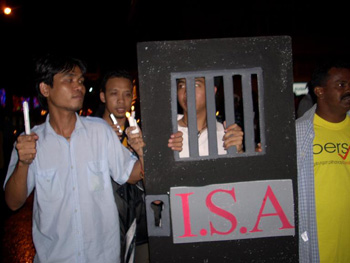Asia
Thailand: `Cockroaches' take over

By Giles Ji Ungpakorn
India: West Bengal Left Front government sides with big capital, attacks peasants

By Satya Sivaraman
Nandigram and Beyond, edited by Gautam
Ray,
Gangchil Publications, Kolkata, 2008, pp 224, Rs395.
In recent times there has been no greater rupture within the Indian left movement than that precipitated by peasant struggles in Singur and Nandigram against forced acquisition of land for industrial purposes. The spectacle of West Bengal’s Left Front regime, led by the Communist Party of India (Marxist) --(CPI (M) -- sending police and party cadre to gun down poor peasants fighting to protect their land not only earned it the wrath of ordinary Indian citizens everywhere but also left large sections among its own supporters deeply divided.
Nepal: CPN (Maoist) national convention -- beginning the `great debate'; Split avoided
By Indra Mohan Sigdel ``Basanta''
December 5, 2008 -- The Nepalese people’s revolution is now at a crucial juncture, full of opportunities and challenges. On the one hand, the possibilities are so great that the party’s success in developing a scientific ideological and political line consistent with the present objective conditions could lead the Nepalese people’s revolution to a victorious accomplishment. And also, it could be a new opening of the world proletarian revolution in the beginning of the 21st century. While on the other hand, its failure to do so would lead to disastrous consequences, leading to an extensive demoralisation of the oppressed classes not only in Nepal but the world over. Therefore, in short, the November 17-26, 2008, national convention of our party, the Communist Party of Nepal (Maoist), had an international dimension.
Malaysia: Bicycle protesters for workers' rights defy police intimidation
Cycle protesters in Penang, December 5
By Oppressed People’s Movement (Jaringan Rakyat Tertindas, Jerit)
December 6, 2008 -- The Oppressed People’s Movement (Jaringan Rakyat Tertindas, Jerit) is conducting a cycling campaign throughout Malaysia to highlight demands for workers' right, which will be presented to the prime minister of Malaysia. The campaign officially began on December 3 at Wisma Darul Aman Kedah, where 50 cyclists were flagged off. They will cycle for 16 days through Kedah, Penang, Perak and Selangor. On December 18, they will hand a memorandum to Prime Minister Abdullah Ahmad Badawi and opposition leader Anwar Ibrahim, at the national parliament in Kuala Lumpur.
Communist Party of Nepal (Maoist): The differences of opinion within our party
By Netra Bikram Chand ‘Biplap’
Thailand und der Coup für die Reichen
Von Giles Ji Ungpakorn.
Indonesia: Activists debate electoral tactic

Indonesia: Tracing a path towards parliament
By
Thailand: A second `coup for the rich'

By Giles Ji Ungpakorn, Bangkok
December 2, 2008 -- Today the constitutional court dissolved the democratically elected governing party, the People Power Party, in Thailand for the second time, forcing the government to resign. This follows the refusal of the armed forces and the police to follow government instructions to clear the two international airports blocked by armed People's Alliance for Democracy (PAD) fascists. [The constitutional court dissolved Thailand's top three ruling parties for electoral fraud in the 2007 election that brought them to power. Prime Minister Somchai Wongsawat has been banned from politics for five years.]
Socialist Party of Malaysia: The left in coalition politics (+ interview with PSM MP)

By Jeyakumar Devaraj
November 8, 2008 -- Ever since the First International, building and working within coalitions with other groups has been one of the strategies used by the left to attempt to advance its political agenda. This practice has continued up until the present.
However the strategy of working in coalitions with other groups has, fairly often, led to controversy, disagreements and even acrimonious splits, both of the coalitions as well as within the left parties involved themselves.
Why does this happen? Is the strategy of coalition work worth the effort and trouble? What are the benefits of coalition building? What are measures a socialist party can take to avoid some of the negative consequences of coalition political work?
Let's party in "Get up! Stand up! Stand up for your rights!" Human Rights Concert
in conjunction with 60th Anniversary of Universal Declaration of Human Rights!
Date: 13 December 2008 (Saturday)
Time: 3.00pm – 6.00pm
Venue: KLSCAH-MCPA Hall
